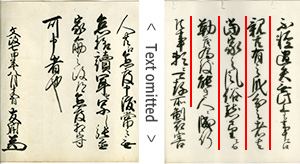This quote comes from the Edo Store Memorandum written by Tomohiro, the ninth head of the Sumitomo family, in 1824.
It states: “Recently, our young clerks are misbehaving. I hear that the problem is improper supervision by those in charge. If young people fall into bad habits and cause problems, don’t hesitate to reprimand them. If you sympathize with them and don’t intervene, they will lose their chance to learn. Some people are unaware that ‘admonishment’ is a merciful action on the part of the master. … Many parents in Edo want their children to serve us because of the Sumitomo family’s excellent customs. They trust us to train our retainers to become ‘good people,’ meaning capable men who possess integrity. If anyone serving us misbehaves and is condemned by others, his superiors are liable.”
These words of Tomohiro should be understood in the context of the Sumitomo family’s circumstances at that time. There was an urgent need to breathe new life into the Sumitomo family whose momentum was faltering because the two preceding heads of the Sumitomo family passed away in quick succession before Tomohiro became head in 1807. In order to maintain the family’s status and the honorable position it had enjoyed since the early Edo period, Tomohiro urged superiors to foster their subordinates and take pride in serving the Sumitomo family.

 EN
EN